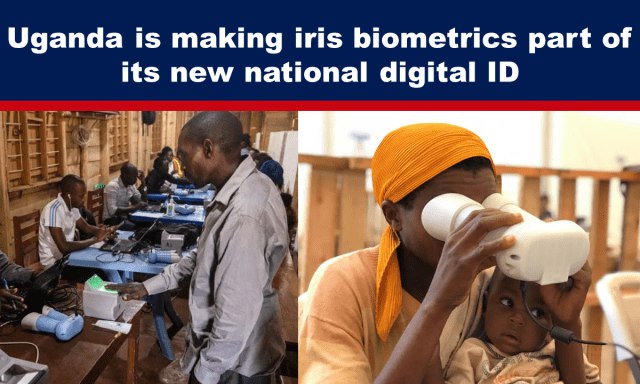Uganda is making iris biometrics part of its new national digital identity card. It serves not just as an added layer of “security” but also as an alternative for people who do not have fingerprints that can be matched.
During a recent parliamentary briefing, Rosemary Kisembo, the Executive Director of the National Identification and Registration Authority of Uganda (“NIRA”), responded to questions about issues raised in the Auditor General’s 2022/2023 report.
Rosemary Kisembo is a Ugandan software engineer and corporate executive who has served as the Executive Director of the National Identification and Registration Authority of Uganda (NIRA) since 14 May 2021. She is an ambassador for ID4Africa, a “movement” that aims to help African nations achieve the objectives of the United Nations (“UN”) Sustainable Development Goal 16.9.
ID4Africa’s foundation partners are the Bill & Melinda Gates Foundation and eBay founder Pierre Omidyar’s Omidyar Network. Its development partner is the World Bank, a specialised agency of the UN, and its thematic partner is Mastercard.
It is claimed that ID4Africa is not directly part of Identification for Development (“ID4D”) and is a regional movement that focuses on digital identity development in Africa. However, ID4Africa aligns with the global ID4D agenda and its goals and has common orchestrators.
ID4D is a World Bank initiative which focuses on promoting digital identification systems, globally. You can see how far this nefarious plan has progressed in various countries HERE. In a report released in 2018 by the World Bank titled ‘ID4D Country Diagnostic: Uganda’ the World Bank stated: “The work of ID4D is made possible with support from World Bank Group, Bill & Melinda Gates Foundation, Omidyar Network, and the Australian Government.”
A more recent report – the ‘World Bank’s Annual Report for 2023’ published in March this year – showcased the significant progress made by ID4D and its ugly sister the Digitalising Government to Person Payments (“G2Px”) initiative and named the collaborators.
ID4D and G2Px’s success would not be possible without the close collaboration and strong support of the Bill & Melinda Gates Foundation; French Treasury; Norwegian Agency for Development (Norad); United Kingdom Foreign, Commonwealth and Development Office; and the Omidyar Network. It is also a result of partnerships with academia, the private sector, and civil society.
World Bank. Putting People at the Centre of Digital Public Infrastructure (DPI): Annual Report 2023 (English). Washington, D.C.: World Bank Group.
http://documents.worldbank.org/curated/en/099647503042425828/IDU1a9d1a6be130dc148e6193181cf9d26959fb9
Further reading:
- Bill Gates and the UN impose their digital IDs on Sierra Leoneans
- Nigeria’s digital prison has been built and the gates are closing
Kisembo’s ambassadorship of ID4Africa, and by extension the Bill Gates-World Bank ID4D initiative, indicates why she was chosen to head NIRA and what is lurking behind the agenda. Bearing this in mind, let’s return to the recent Ugandan parliamentary briefing.
According to the Uganda Broadcasting Corporation (“UBC”), Kisembo stated that there are currently 1 million people in NIRA’s register whose fingerprints did not satisfy the requirements. However, the authority also uses facial recognition to capture biometric data. So, NIRA will start incorporating iris scans in capturing biometric data for people registering to acquire national identities (“IDs”).
NIRA had announced its intention to add iris biometrics to the national ID card, produced in partnership with Veridos, early this year.
According to Kisembo, face and iris biometrics will be collected from persons who have lost their vital fingerprint features either due to ageing, injury, permanent disabilities, or other physical conditions that make the capture of one’s fingerprints difficult or impossible. This was part of her response to a question on why verification machines have been unable to recognise some people’s fingerprints. She mentioned that about one million fingerprint records in the registry are no longer recognisable.
As well as government subsidies, NIRA collects revenue through various means to support its operations and services:
- Registration fees from National Identification Number (“NIN”) registration, National Identity Card registration and Replacement of lost or damaged identity cards.
- Fees for services such as verification of identity documents and Issuance of duplicate identity cards.
- Other fees such as from the sale of identity cards to non-citizens and fees for the provision of identity verification services to government agencies and private organisations.
They are making people pay for the system that will enslave them.
Showing no signs of shame, during the parliamentary briefing, lawmakers sought an explanation on why just about half of the 15 billion Ugandan shillings (£3.2 million) expected as non-tax revenue from NIRA in the 2022/2023 fiscal year was collected.
Kisembo said this is due to delays in starting the mass registration and renewal process for the national ID from which UGX7.9 billion (£1.7 million) was projected to be raised.
NIRA put off a plan to commence mass enrolment for the national ID in June, and it is now not clear when exactly the exercise will begin.
Kisembo also took the opportunity to remind lawmakers that NIRA remains headquartered at a facility owned by the Ministry of Defence. The agency has requested offices of its own for the last four years, but the request has been “an unfunded priority” each year, she said, according to New Vision.
The above is adapted from the article ‘NIRA explains adding iris biometrics to Uganda ID’ published by Biometric Update. You can read the original article HERE.
Featured images taken from Uganda Set to Deploy DNA Recognition ‘Smart Digital’ Biometric ID, Vision Times, 12 August 2022 (left) and Iris biometrics for food distribution, IriTech, 14 March 2022 (right).
Source: https://expose-news.com/2024/07/09/uganda-is-making-iris-biometrics-part-of-its-national-digital-id/
Bitchute: https://www.bitchute.com/channel/YBM3rvf5ydDM/
Telegram: https://t.me/Hopegirl587
EMF Protection Products: www.ftwproject.com
QEG Clean Energy Academy: www.cleanenergyacademy.com
Forbidden Tech Book: www.forbiddentech.website













